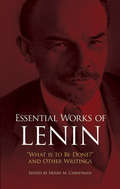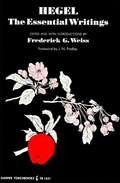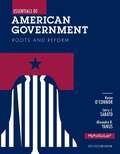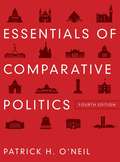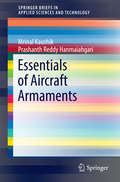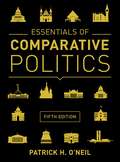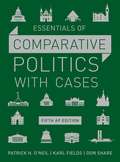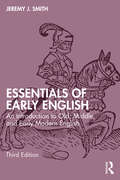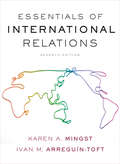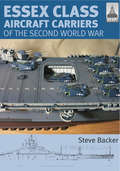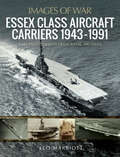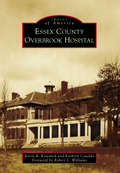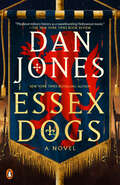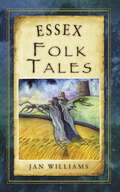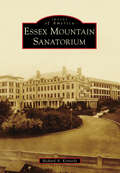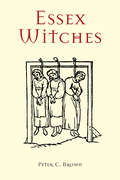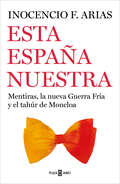- Table View
- List View
Essential U. S. History
by Lillian Forman Paul M. Roberts Paula A. Franklin Gerard J. PelissonThis text is designed for a one-year United States history course for adults studying on the high school level and for regular day high school students. Essential U.S. History focuses on the history of the United States (including the land and its people before it became the United States). Its coverage begins with a study of major groups of Native-American culture and comes up to the mid-term elections of 2006. Following the curricula of many states, this fully illustrated book is organized chronologically but with separate regional emphasis within each time period. The text prepares students taking a high school United States history course by giving them high-interest but comprehensive coverage of key events and themes in American history. The book's sophisticated presentation works especially well with adult education students. However, it has been written and designed to facilitate instruction in any U.S. history classroom.
Essential Works of Lenin: "What Is to Be Done?" and Other Writings
by Vladimir Ilyich LeninAmong the most influential political and social forces of the twentieth century, modern communism rests firmly on philosophical, political, and economic underpinnings developed by Vladimir Ilyich Ulyanov, later known as Lenin. In this volume, comprising the four works generally considered his most important publications, Lenin presents the goals and tactics of Communism with remarkable directness and forcefulness.His first major work was The Development of Capitalism in Russia, written in prison after Lenin had been arrested for anti-government activities in 1895. Represented here by key sections, the book developed a number of crucial concepts, including the significance of the industrial proletariat as a revolutionary base. What Is to Be Done?, long regarded as the key manual of Communist action, is presented complete, containing Lenin's famous dissection of the Western idea of the political party along with his own concept of a monolithic party organization devoted to achieving the goal of dictatorship of the proletariat. Also presented complete is Imperialism, the Highest Stage of Capitalism, in which Lenin examines the final "parasitic" stage of capitalism. Finally, this volume includes the complete text of The State and Revolution, Lenin's most significant work, in which he totally rejects the institutions of Western democracy and presents his vision of the final perfection of Communism.For anyone who seeks to understand the twentieth century, capitalism, the Russian revolution, and the role of Communism in the tumultuous political and social movements that have shaped the modern world, the essential works of Lenin offer unparalleled insight and understanding. Taken together, they represent a balanced cross-section of this revolutionary theories of history, politics, and economics; his tactics for securing and retaining power; and his vision of a new social and economic order.
Essential World History
by Henry Brun Margaret FransonThis text is designed to provide students with a readable and enjoyable discovery of the development of civilizations and cultures in Asia, Africa, Europe, the Middle East, and the Americas.
Essential Writings
by Georg Wilhelm Friedrich Hegel Frederick G. WeissHegel's essential writings on all aspects of philosophy
Essentials Of American Government: Roots And Reform, 2012 Election Edition
by Larry J. Sabato Karen J. O'Connor Alixandra B. YanusEssentials of American Government: Roots and Reform, 2012 Election Edition explores how the origins of American government affect the issues facing the United States today. This streamlined and flexible text offers the strongest coverage of history and current events. This approach encourages students to study present political structures and behaviors in full constitutional and historical context. The text helps students learn how our government evolved and how they can become more informed citizens. Most importantly, it encourages them to discover that politics can be-and most often is-a good thing. This text features full integration with the New MyPoliSciLab. MyPoliSciLab includes a wide array of resources to encourage students to look at American politics like a political scientist and analyze current political issues. Political Explorer lets students play the role of a political scientist by investigating issues through interactive data. Core Concept videos discuss the big ideas in each chapter and apply them to key political issues. Simulations allow students to experience how political leaders make decisions. A better teaching and learning experience This program provides a better teaching and learning experience-for you and your students. Here's how: Personalize Learning-The New MyPoliSciLab delivers proven results in helping students succeed, provides engaging experiences that personalize learning, and comes from a trusted partner with educational expertise and a deep commitment to helping students and instructors achieve their goals. MyPoliSciLab is now compatible with BlackBoard! Engage Students-The stunning visual design engages students in the text. Improve Critical Thinking- Learning objectives in every chapter help students focus on important topics. Analyze Current Events-Coverage of the 2012 elections keeps the study of politics relevant and shows how political scientists look at the development of the American political system. Support Instructors-A full supplements package including the Class Preparation Tool in the New MyPoliSciLab is available. Note: This is a standalone book if you want the book/access card order the ISBN below: 0205950019 / 9780205950010 Essentials of American Government: Roots and Reform Plus MyPolisciLab with Pearson eText, 2012 Election Edition Package consists of: 0205883990 / 9780205883998 Essentials of American Government: Roots and Reform, 2012 Election Edition 0205949975 / 9780205949977 NEW MyPoliSciLab with Pearson eText -- Valuepack Access Card
Essentials Of Comparative Politics (Fourth Edition)
by Patrick H. O'NeilEssentials of Comparative Politics introduces students to the concepts that political scientists use to study and compare political systems and the particulars of specific political systems. The Fourth Edition has been revised and updated to include the most current and relevant examples and scholarship. The text is available with a corresponding casebook of 13 country studies and a corresponding reader; the three components can be used individually or in any combination.
Essentials of Aircraft Armaments
by Mrinal Kaushik Prashanth Reddy HanmaiahgariThis book aims to provide a complete exposure about armaments from their design to launch from the combat aircraft. The book details modern ammunition and their tactical roles in warfare. The proposed book discusses aerodynamics, propulsion, structural as well as navigation, control, and guidance of aircraft armament. It also introduces the various types of ammunition developed by different countries and their changing trends. The book imparts knowledge in the field of design, and development of aircraft armaments to aerospace engineers and covers the role of the United Nations in peacekeeping and disarmament. The book will be very useful to researchers, students, and professionals working in design and manufacturing of aircraft armaments. The book will also serve air force and naval aspirants, and those interested in working on defence research and developments organizations.
Essentials of Comparative Politics
by Patrick H. O'NeilThe Essentials of Comparative Politics family provides all of the tools professors need to introduce the study and comparison of political systems. A brief conceptual textbook of the core ideas behind comparative politics, a complete casebook of thirteen country studies, and a comprehensive reader of secondary and primary sources.
Essentials of Comparative Politics with Cases Fifth AP Edition
by Don Share Patrick H. O'Neil Karl FieldsThis textbook is meant to contribute to our understanding of comparative politics (the study of domestic politics around the world) by investigating the central ideas and questions that make up this field. It begins with the most basic struggle in politics--the battle between freedom and equality and the task of reconciling or balancing these ideals. How this struggle has unfolded across place and time represents the core of comparative politics. The text continues by emphasizing the importance of institutions. Human action is fundamentally guided by the institutions that people construct, such as culture, constitutions, and property rights. Once established, these institutions are both influential and persistent--not easily overcome, changed, or removed. How these institutions emerge, and how they affect politics, is central to this work.
Essentials of Early English: An Introduction to Old, Middle, and Early Modern English
by Jeremy J. SmithThe third edition of this successful textbook has been fully revised and updated. Essentials of Early English is a practical and highly accessible introduction to the early stages of the English language: Old English, Middle English, and Early Modern English. Designed specifically as a handbook for students beginning the study of Early English language, whether for linguistic or literary purposes, it presumes little or no prior knowledge of the history of English. Features of this new edition include: Comprehensive updating of the contents to take account of new developments in the subject Newly added sample texts and accompanying notes Links to images of many of the illustrative texts An updated annotated bibliography. A contextual introduction of the history of English is provided, which includes an outline of English in relation to its origins. A deeper analysis is then given on each of the key stages of Early English, using the language of King Alfred, Chaucer, and Shakespeare respectively to illustrate points. Thus, the essential characteristics of each stage of the language are provided to create the ideal course book for History of English courses and to give the student a firm foundation of basic linguistic knowledge which can be applied to further study.
Essentials of International Relations
by Ivan M. Arreguin-Toft Karen MingstEssentials of International Relations has long provided the clearest explanations of core concepts and theories; in its Seventh Edition, robust new “Behind the Headlines” features and engaging new chapter openers help students more easily draw connections between international relations concepts and today’s political climate.
Essex (Images of America)
by Kurt A. Wilhelm Dawn RobertsonEssex is nestled on the Atlantic coast within beautifully preserved hills, forest, fields, and wetlands--but the serene landscape belies the town's rich history. According to tradition, the first Essex boat was built in an attic around 1660. Eventually, this shipbuilding industry would create a thriving town as it developed into one of the largest producers of fishing schooners in the country. By its incorporation in 1819, Essex was a renowned community of fishing, farming, shipbuilding, and other industries. Over time, Essex became the birthplace of the fried clam, sent a native son to the baseball major leagues, acquired a Paul Revere church bell, and raised a barn that is now the oldest still in use in America. With a newly gathered collection of vintage images, Essex reveals a microcosm of American culture and growth, telling the story of leading patriots, entrepreneurs, Civil War heroes, and hardworking everyday citizens.
Essex (Images of America)
by Jackie NickelAdvertised in a 1909 sales brochure as "The Rising Suburb of the East," Essex, Maryland, has seen its fate and fortune rise and fall and rise again. The town enjoyed its early reputation as a haven for city dwellers with picnic groves, hunting and fishing clubs, dance halls, and waterfront amusement parks. The boom continued with new jobs and prosperity until the 1950s, when a fire destroyed much of the town's main street. Economic decay set in as a result of the loss of industry and an influx of low-income housing. Several attempts at redevelopment and legislation failed, resulting in the residents' distrust of government intervention. Finally a county-backed Renaissance project was established in 2002, bringing Essex a new epithet: "The Hidden Gem of Baltimore County."
Essex Class Aircraft Carriers of the Second World War (ShipCraft)
by Steve BackerA stern-to-bow look at the most powerful aircraft carrier design of World War Two from the author of Bismarck and Tirpitz in the ShipCraft series. The latest volume covers the hugely important American carrier of the Second World War. Built in larger numbers than any fleet carrier before or since, the Essex class can claim to be the US Navy&’s most significant weapon in the defeat of Japan. Carrying up to 100 aircraft and capable of absorbing enormous punishment (not one was sunk), they spearheaded the Fast Carrier Task Forces for most of the Pacific War. The heavily illustrated work contains everything a modeller needs to know about this prolific class. &“This book is well written and the text is supported by good sharp photos and illustrations. If your interest is World War II warships or ship modelling, this book should be in your library.&”—PowerShips
Essex Class Aircraft Carriers, 1943–1991: Rare Photographs From Naval Archives (Images of War)
by Leo MarriottA photographic history of the US Essex-class aircraft carriers of World War II—including the USS Intrepid that now serves as a New York City museum.Essex-class aircraft carriers played an essential role in the victory of the United States over Japan in the Second World War, and Leo Marriott’s photographic history is a fascinating introduction to them. Without these remarkable ships, the island-hopping campaign of American forces across the Pacific towards Japan would not have been possible. They also took part in the Korean and Vietnam wars that followed.During the Second World War they were at the center of the powerful task groups that could put up hundreds of aircraft to support forces on the ground. They were also prime targets for Japanese air attacks, in particular the kamikaze suicide missions. A total of twenty-four were eventually commissioned including several after the end of the war.The selection of rare photographs and the expert text cover the evolution of US aircraft carrier design prior to the Second World War and look at the factors which shaped the design and construction of the Essex class. Included are dramatic action shots of the new breed of naval aircraft that was launched from their flight decks, including Hellcat and Corsair fighters that took on the Japanese and the carrier-borne jets that flew over Korea and Vietnam.“An outstanding book.” —Anchorwatch“A book that will surely delight all naval history enthusiasts because it well illustrates the importance that the aircraft carrier had in changing the way warfare is waged at sea.” —On the Old Barbed Wire
Essex Class Aircraft Carriers, 1943–1991: Rare Photographs From Naval Archives (Images of War)
by Leo MarriottA photographic history of the US Essex-class aircraft carriers of World War II—including the USS Intrepid that now serves as a New York City museum.Essex-class aircraft carriers played an essential role in the victory of the United States over Japan in the Second World War, and Leo Marriott’s photographic history is a fascinating introduction to them. Without these remarkable ships, the island-hopping campaign of American forces across the Pacific towards Japan would not have been possible. They also took part in the Korean and Vietnam wars that followed.During the Second World War they were at the center of the powerful task groups that could put up hundreds of aircraft to support forces on the ground. They were also prime targets for Japanese air attacks, in particular the kamikaze suicide missions. A total of twenty-four were eventually commissioned including several after the end of the war.The selection of rare photographs and the expert text cover the evolution of US aircraft carrier design prior to the Second World War and look at the factors which shaped the design and construction of the Essex class. Included are dramatic action shots of the new breed of naval aircraft that was launched from their flight decks, including Hellcat and Corsair fighters that took on the Japanese and the carrier-borne jets that flew over Korea and Vietnam.“An outstanding book.” —Anchorwatch“A book that will surely delight all naval history enthusiasts because it well illustrates the importance that the aircraft carrier had in changing the way warfare is waged at sea.” —On the Old Barbed Wire
Essex County Overbrook Hospital (Images of America)
by Robert L. Williams Kevin R. Kowalick Kathryn CataldoWhat was founded as the Essex County Lunacy Asylum evolved from a single building on South Orange Avenue to a city within itself in Cedar Grove. It was named the Essex County Overbrook Hospital. Construction began on the hospital's iconic brick buildings in 1896, and they were prominent features on Fairview Avenue for the next 100 years. The facility produced its own food, housed its own police and fire departments, and sustained its own power sources. The Essex County Overbrook Hospital was recognized throughout the world as a leader in psychiatric care. In later years, overcrowding began to plague the institution. However, after the advent of modern psychiatric drugs, many patients were able to be discharged back into the community. In 2007, the buildings were closed, and the hospital was relocated to a newer establishment nearby. The grounds have since been plagued with vandalism and neglect, with a final deal for demolition having been solidified in 2015.
Essex Dogs: A Novel (Essex Dogs Trilogy #1)
by Dan JonesA Kirkus Reviews Best Book of 2023The New York Times bestselling historian makes his historical fiction debut with an explosive novel set during the Hundred Years' War.July 1346. Ten men land on the beaches of Normandy. They call themselves the Essex Dogs: an unruly platoon of archers and men-at-arms led by a battle-scarred captain whose best days are behind him. The fight for the throne of the largest kingdom in Western Europe has begun. Heading ever deeper into enemy territory toward Crécy, this band of brothers knows they are off to fight a battle that will forge nations, and shape the very fabric of human lives. But first they must survive a bloody war in which rules are abandoned and chivalry itself is slaughtered. Rooted in historical accuracy and told through an unforgettable cast, Essex Dogs delivers the stark reality of medieval war on the ground – and shines a light on the fighters and ordinary people caught in the storm.
Essex Folk Tales (Folk Tales: United Kingdom)
by Jan WilliamsThe Essex coastline has endured invasion by plundering and bloodthirsty Romans, Anglo-Saxons and Vikings, and this mysterious landscape is still haunted by their presence. Their spirits, and countless others, have oft been reported – not least by smugglers determined to keep intruders away from their secret hideouts. Even more dramatic stories of the supernatural lurk inland: accusations of witchcraft have been screamed around many picturesque market towns, dragons have terrorised the community, and a violent White Lady has struck at Hadleigh Castle. Indeed, it is the women of Essex who have stirred the imagination most – from brave Boudicca and beautiful Edith Swan-neck to the adulteress Kitty Canham. Amid the county’s infamous pirates, highwaymen and desperados, Essex can even boast a lady smuggler.
Essex Mountain Sanatorium (Images of America)
by Richard A. KennedyFounded in 1907 amidst protests and a burgeoning suffrage movement, Essex Mountain Sanatorium was the result of two Montclair, New Jersey, women who successfully lobbied local government to establish a tuberculosis sanatorium in a then vacant cottage for wayward girls. From these humble beginnings, the hospital grew to become one of the finest treatment centers in the nation, expanding into a complex of 20 buildings that encompassed nearly 300 acres. Ironically, medical advances pioneered at places such as the sanatorium and the advent of antitubercular drugs in the years following World War II led to decreasing patient enrollment, which made such large facilities unnecessary. When it was eventually abandoned in the early 1980s, the hospital began its second act as a haven for urban explorers, vandals, and arsonists, becoming shrouded in mystery and the source of local legends and myths. After suffering years of neglect and abuse, the main complex would finally fall to wreckers in 1993, ending an important era in county, state, and national history.
Essex Murders (Sutton True Crime History)
by Linda StratmannThe county of Essex has rolling arable farmland, Epping Forest, sleepy villages, busy market towns and secluded backwaters - a wide variety of settings for murder. This selection of crimes uncovers not only famous cases, but also previously unpublished dramatic and tragic tales. The accounts included here come from a time when murder was a capital offence, carrying the ultimate penalty for the perpetrator, and when the difference between a verdict of innocence or guilt rested on a single piece of evidence, or the skill of the barrister in defence. Linda Stratmann has used original trial transcripts, material from local and national archives, contemporary accounts and the memoirs of pathologists, police and those in the legal profession in the course of her extensive research into crimes that have shocked the county. The killings explored date from as far back as the eighteenth century when the smuggler 'Colchester Jack' shot a confederate in the stomach in a row over stolen goods. They also include the case of a nineteenth-century female poisoner from Clavering and the brutal murder of a taxi driver in 1943 by two US servicemen at Birch. Supported by contemporary illustrations, "Essex Murders" reveals that behind the county's peaceful facade lies a murky criminal heritage.
Essex Witches
by Peter C. BrownMedieval folk had long suspected that the Devil was carrying out his work on earth with the help of his minions. In 1484 Pope Innocent VIII declared this to be true, which resulted in witch-hunts across Europe which lasted for nearly 200 years. In 1645, England (notably Essex) was in the grip of witch fever. Between 1560 and 1680 in Essex alone 317 women and 23 men were tried for witchcraft, and over 100 were hanged. Essex Witches recounts many of the local common folk who were tried in the courts for their beliefs and practice in herbal remedies and potions, and for causing, often by their familiars, the deaths of neighbours and even family members, and had meted out the harshest penalties for their sorcery and demonic ways.
Essex and Essex Junction
by Richard Allen Lucille AllenIn Essex and Essex Junction, readers will learn that early settlers tapped the waterpower at Hubbel's Falls and tilled the fertile land of Essex town in western Vermont. The advent of the railroad brought prosperity in the mid-1800s and a name change for the village of Essex Junction. Fort Ethan Allen further boosted the area's prominence and increased activity in the town. When IBM came to Essex, the area experienced the rapid growth and resulting challenges similar to that felt throughout much of Vermont. Today the town of Essex and the village of Essex Junction are vibrant communities with fascinating histories.
Essex at War, 1939–45 (Your Towns & Cities in World War Two)
by Frances ClampAlthough much maligned, Essex is a vibrant county with a long and exciting history. Being close to the Continent and with one of Britains longest coastlines, it was an obvious target for invasion as the threat of war grew. Many defensive structures were built by the sea and to protect major routes across the county. The remains of pill boxes can still be seen.Essex at War 1939–1945 tells how war greatly affected the county: children were evacuated both to and from Essex; being close to London the county suffered from regular air attacks; farming was important and the Womens Land Army arrived in force. Accounts of Essex airmen and sailors who supported those escaping from Dunkirk are told, and once the USA entered the war there was a new type of invasion in the county when their servicemen arrived and were welcomed at many of the countys airfields.Memories of children growing up during those difficult years are recalled. These include nights spent in cold, damp Anderson shelters, sleeping under solid tables or in claustrophobic Morrison shelters. We learn about disrupted school lessons and the fear felt when the air raid siren wailed. When the V-1 and V-2 unmanned flying bombs were launched in 1944, many still remember listening for the engines to switch off and counting the seconds until they fell to earth.
Esta España nuestra: Mentiras, la nueva Guerra Fría y el tahúr de Moncloa
by Inocencio F. AriasTras el éxito de su último libro, Con pajarita y sin tapujos, el diplomático de la mirada inteligente y la pluma afilada, vuelve para hacer un certero, ingenioso y, en ocasiones, socarrón repaso al mundo contemporáneo post-COVID 19. Cuando «el inquilino de Moncloa» pregonó durante los peores momentos de la pandemia que tras esta «saldríamos mejores», no quiso ver la obviedad de lo que se avecinaba y probablemente minimizó a sabiendas el contraataque independentista de Cataluña tras el fracaso del procés, las luchas de poder con sus socios de gobierno encabezados por Pablo Iglesias, el menguante papel de España en el extranjero o el desastre económico actual que ha subido los niveles de corrupción y, sobre todo, de desempleo a límites estratosféricos. Que no cunda el pánico: Inocencio F. Arias vuelve para recordarnos, con lucidez e ironía, que Esta España nuestra está lejos de ser el país de luz y color que nos han vendido. La mentira es ya una seña de identidad. Pero no se queda ahí: además reflexiona, con su humor característico y sin tomar rehenes, sobre la unidad de España, la memoria histórica, los retos a los que se enfrenta la Monarquía, el auge y la posterior pérdida de credibilidad de Biden, la Ley del Embudo de Podemos, las consecuencias de encolerizar torpemente a Marruecos, la debilitada posición de la Iglesia en España o la responsabilidad del gobierno en nuestra cuarteada imagen en el exterior, entre otros muchos temas. Y hasta se atreve con un fascinante relato de política-ficción sobre qué hubiera sucedido si la República hubiera ganado la Guerra Civil.

